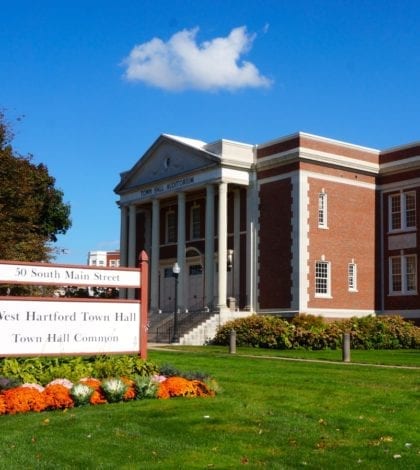West Hartford Town Council Considering Fracking Waste Ordinance

Audio By Carbonatix

West Hartford Town Hall. Photo credit: Ronni Newton
The West Hartford Town Council has asked staff to examine the current ban and draft an ordinance prohibiting fracking.
By Abigail Albair, West Hartford Press Executive Editor
Editor’s Note: This article appears courtesy of a partnership with The West Hartford Press, a product of TurleyCT Community Publications. To read and request a print copy of West Hartford’s weekly newspaper, visit turleyct.com.
Members of the West Hartford Town Council are considering a fracking prohibition.
Several residents attended a Community Planning and Physical Services Committee meeting Wednesday, Feb. 21 to encourage officials to adopt an ordinance prohibiting the storage, disposal or use of fracking waste, or any derivative thereof.
Officials referenced ordinances from Middletown, Windham, and Mansfield for perspective of other towns.
Last month, more than two dozen residents came to Town Hall to learn about the effort to get Connecticut municipalities to ban fracking waste.
To date, 37 towns have taken up a ban of any waste associated with the process known as hydraulic fracturing, a common drilling practice in states like Pennsylvania that involves “L” shaped bore drilling in which a combination of water, sand and chemicals are used at high pressure to create underground fissures, allowing access to hard-to reach oil or gas.
The drilling, fracturing, production and dehydrating, and treatment processes produce both liquid and solid waste, that, according to advocates, contains hundreds of toxic, and sometimes radioactive, materials.
In addition to waste, the byproducts of fracking are also being utilized for “beneficial uses,” such as construction fill, de-icing liquids, and de-watered salts, which advocates say studies show to be unsafe.
According to a Duke University study, more than 6,600 spills have been documented in four states, more than half during the moving and transporting of waste.
A project called Fractcheck.com, run by Texans for natural gas, portends that activists have overstated the risk of fracking. The practice is proven, “stringently regulated” at all levels, and protects human health with technologies that lower emissions, according to the site.
Others, including a group of West Hartford residents, disagree and are working with Food and Water Watch to try and get the activities banned locally, which they hope keeps pressure at the state level.
In December, the West Hartford Clean Energy Commission unanimously voted to recommend that the town adopt an ordinance to ban the waste.
In 2014, the state legislature passed a moratorium on fracking waste with a directive for the Department of Energy and Environmental Protection to submit potential regulations for review between July 1, 2017 and July 1, 2018.
Kimberly Boneham, the town’s deputy corporation counsel, said Wednesday that her office reached out to DEEP and was told that the deadline likely won’t be met.
Still, the statute, she said, dictates that the disposal of waste will not be permitted until regulations are adopted.
There is also a bill, Senate Bill 103, under consideration in the Connecticut General Assembly that would prohibit the practice outright. If DEEP were to draft regulations, the practice could be allowed under certain conditions, Boneham noted.
Of the 37 towns that have adopted a ban, 36 used the same template, a resident told the committee Wednesday morning.
The first town to adopt a ban, Washington, did so using state moratorium language, which is less comprehensive, the resident said. The state moratorium language and current bill only prohibit the waste from hydraulic fracturing, but there are other oil and gas exploration or extraction activities that produce the waste.
Specifically, solid waste is produced a month before hydraulic fracturing even takes place and that is the material used in construction fill.
Committee members asked town staff to continue to examine the current ban, what processes beyond those covered in that ban could be prohibited, and return to a future meeting with more details and a potential ordinance.
Like what you see here? Click here to subscribe to We-Ha’s newsletter so you’ll always be in the know about what’s happening in West Hartford!



